As a new beginner investor, finding an online broker is the key to successful investing. A good trading platform should be selected based on easy navigation, educational resources, investment choices, and top-tier customer service.
Here are several options to consider, along with a detailed how-to guide that will help you get started on your investing journey. If you want to learn about market maker brokers, check out our guide here.
Best Brokers For Beginners 2023
We based our research on many factors. Broker fees and commissions, account opening, customer support, investment options, education and research and much more was considered. Here is the list of the best brokerage accounts for beginners:
- eToro – Best For Broker for Beginners Overall
- Interactive Brokers – Best Market Acces Broker For Beginners
- TD Ameritrade – Best Education for Beginners
- SoFi Investing – Great for Stocks and ETFs
- Firstrade – Great Mobile Broker For Beginners
- Firstrade
- Charles Schwab
- Webull
- ThinkorSwim
- Ally Invest
- Vanguard
- Robinhood
- e*Trade
- Merrill Edge
- Acorns
- Fidelity
- TradeStation
eToro – Best Broker For Beginners
eToro is an overall winner for beginner investors. The firm is great when it comes to crowdsourcing ideas and copy trading. This brokerage offers web and mobile trading platforms that are easy to navigate. Traders have access to a broad range of trading strategies to copy. This includes forex, CFDs, and cryptocurrencies.
A Demo Account is available with $100,000 in virtual funds.
eToro is pricey when it comes to trading forex and CFDs though. Their research tools are a bit limited.
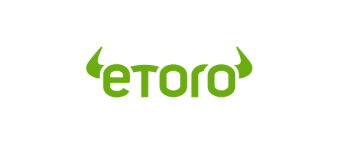
| PROS | CONS |
|---|---|
| Free stock trading | Limited research material |
| Strong community of traders | Withdrawal and inactivity fees |
| User-friendly web and mobile platform | |
| Paper trading offered | |
| Cryptocurrency tools |
CFDs are complex instruments and come with a high risk of losing money rapidly due to leverage. 68% of retail investor accounts lose money when trading CFDs with this provider. You should consider whether you understand how CFDs work, and whether you can afford to take the high risk of losing your money. eToro USA LLC does not offer CFDs, only real Crypto assets available.
TD Ameritrade
TD Ameritrade is an excellent choice for beginner investors. It stands out for its user-friendly trading tools and in-depth market research. Traders have access to a seamless mobile app platform that is suitable for both beginners and experienced active traders. The mobile app features educational resources to help new investors to get started.
Free paper trading is available for beginners, along with excellent 24/7 customer service.
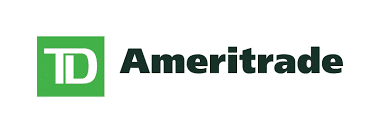
| PROS | CONS |
|---|---|
| Commission-free stock, ETF, and options trading | No fractional shares |
| Well-designed and user-friendly mobile app | |
| 24/7 customer service | |
| Paper trading available | |
| Excellent educational resources for beginners |
Sofi Active Investing
SoFi Active Investing is aimed at beginner investors. It isn't the best option for those needing in-depth stock analysis.
SoFi offers an easy platform to buy and sell stocks, ETFs, and cryptocurrencies. Fractional shares are also available for beginners starting out on a budget.
That's about it though. For anything else, you'll have to find another broker.
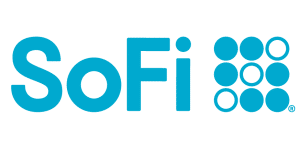
| PROS | CONS |
|---|---|
| $0 stock and ETF commissions | No mutual funds available |
| High-quality mobile app platform | No tools for in-depth stock analysis |
| Low account minimum and fees | |
| Fractional shares and cryptocurrencies |
FirstTrade
Firstrade provides a user-friendly mobile platform with a great search function for beginners.
The platform features high-quality research with a range of tools, including trading ideas and detailed trading data. There is a great selection of educational tools including videos and webinars.
On the other hand, there is no two-step login feature and price alerts are unfortunately not included.
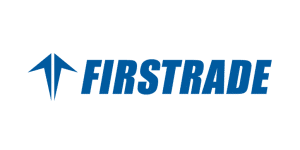
| PROS | CONS |
|---|---|
| Free stock, ETFs, and options trades | No 24/7 customer support available |
| High-quality research and educational tools | No two-step login feature |
| All mutual funds are commission-free |
Charles Schwab
Charles Schwab offers top-tier research and trading tools. With detailed trading strategies and data available, it is best for clients looking to invest for retirement.
The firm provides reliable and helpful 24/7 customer support in case you need assistance.
On the downside, Charles Schwab only allows you to trade on US and Canadian markets. They also charge high fees for mutual fund trades.

| PROS | CONS |
|---|---|
| Free stock and EFT trading offered | Available for only US and Canadian markets |
| Extensive research tools offered | High mutual fund fees |
| Excellent customer service |
Webull
Webull's selling point is its mobile app platform. It offers better platform flexibility than most of its competing firms. Beginners will find the platform’s unique community-building features useful for learning. Compared to completion, Webull is lacking research and educational tools though. The app's trading tools are better suited for active traders than for beginners.
Webull is best for experienced active traders dealing in stocks and options through a mobile app.
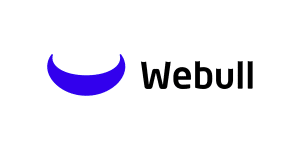
| PROS | CONS |
|---|---|
| Very functional mobile platform | No fractional shares or mutual funds |
| Suitable for active trading | Limited research and educational tools |
| Competitive margin rates |
ThinkorSwim
TD Ameritrade offers ThinkorSwim as a desktop trading platform. This trading platform easily rivals its competitors.
While it does have a learning curve, ThinkorSwim is a great choice for beginners looking to expand on their trading strategies. It features a powerful charting program with various customization features.
This platform also offers a paper trading account to TD Ameritrade account-holders.
On the downside, the tools for options trading a bit tricky for beginners to navigate.
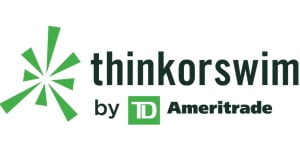
| PROS | CONS |
|---|---|
| Professional-level charting | Steep learning curve for software |
| Options, futures, and forex available | Option tools aren’t user-friendly |
| Range of educational tools | |
| Ability to customize the platform | |
| Paper trading offered |
Ally Invest
Ally Invest aims at both beginner and experienced traders in the US. The firm offers a wide variety of commission-free mutual funds, options, and ETFs trades. Forex trading is also available with Ally Invest.
Ally Invest exceeds expectations for a discount broker with self-directed portfolio management and various free technical tools.
For futures trading and fractional shares, you'll need to look elsewhere. If you're wanting to trade smaller amounts then Ally Invest isn't the best for you.
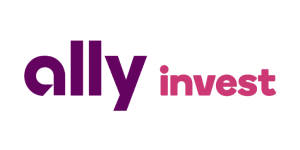
| PROS | CONS |
|---|---|
| Commission-free trades on a range of stocks, options, and ETFs | Only US markets available for trading |
| Forex trading offered | No futures and fractional shares |
| Wide range of educational resources | |
| Strong web-based platform | |
| Automated portfolio management option |
Vanguard
A great option for beginners, Vanguard features an old-school style appeal that experienced traders won’t appreciate. Retirement savers and buy-hold investors however, will appreciate this platform.
It’s a simple but appealing platform that is easy to learn.
Vanguard is not ideal for active trading due to having only 10 technical indicator tools available on its charting software, and it doesn’t offer forex or futures trading.
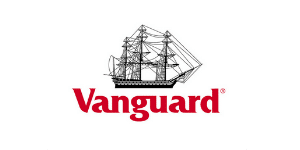
| PROS | CONS |
|---|---|
| Excellent market research | No forex or futures trading |
| Simple to use and learn | Small selection of charting tools |
| Large selection of inexpensive ETFs and mutual funds |
Robinhood
Robinhood offers only the basics for beginners. Its strength is in its simplicity and low fees. It is best for beginners on a budget who are looking for low fees.
Robinhood’s bare-bone mobile platform is easy to navigate, which is perfect for new investors. Although there are no educational offerings, so resources will have to be found elsewhere.
The platform offers very little market research and trading tools, which is a downside for more experienced traders.
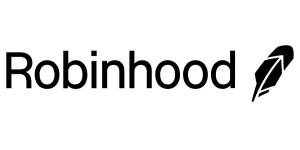
| PROS | CONS |
|---|---|
| Low fees | Very limited educational resources |
| Very user-friendly platform | |
| Simple to use | |
| Fractional shares offered |
E*TRADE
E*TRADE is one of the most well-known online discount brokers, but it isn’t the most beginner-friendly.
It is best for options trading, offering a fast order execution time. The mobile app allows you to easily trade on-the-go. If you're after a more passive investment approach, then you should look elsewhere. Less frequent traders will face steeper per-contract commission fees.
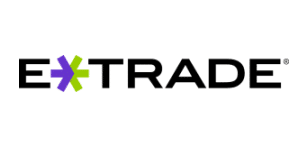
| PROS | CONS |
|---|---|
| Two comprehensive mobile apps | Higher per-contract options fees for less frequent traders |
| Paper trading offered | Only for US citizens |
| Wide range of research and analysis tools | |
| Prebuilt Portfolio for a fast track to markets |
Merrill Edge
Merrill Edge is another solid option for beginner investors, particularly customers of the Bank of America. It offers top-notch research and analysis tools.
It also provides excellent customer service and a cash-back rewards program. You can sit down face-to-face with an advisor in almost any Bank of America branch nationwide.
Merrill Edge’s margin rates and per-contract fee are on the pricey side. You can't trade options, futures, or cryptocurrencies.
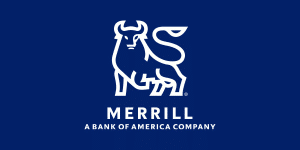
| PROS | CONS |
|---|---|
| Thorough stock research available | High margin rates and per-contract options fees |
| Various stock analysis tools offered | No futures trading, futures options, or cryptocurrency |
| Easy access to customer support | |
| Cash-back rewards program |
Acorns
Acorns is a good stepping stone for beginner investors to build healthy financial habits. With its optional Round-Up feature, every credit card transaction you make is rounded up to the nearest dollar. Your spare change is then invested by Acorn.
While micro-savings is the main appeal, Acorn is great for retirement and custodial investment accounts.
A disadvantage is Acorns’ high management fees. It also charges per ETF transfer, which is surprising for online brokers nowadays.
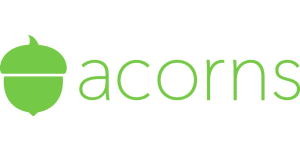
| PROS | CONS |
|---|---|
| Micro-savings feature | Expensive management and trade fees |
| Good educational resources | |
| Unique rewards program |
Fidelity
As a leading full-service broker, Fidelity has several managed investment options for beginners to choose from. This includes personalized portfolios and advisory services.
They offer a premium trading platform and research. It boasts commission-free trades of stock, options, and ETFs. Plus, it offers no-fee index funds.
Fidelity doesn’t offer futures or forex trading, which is a downside. The firm also charges high broker-assisted fees.
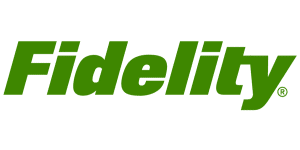
| PROS | CONS |
|---|---|
| Commission-free stock, options, and ETFs | High broker-assisted trade fees |
| Premium research offered | Lack of futures and forex trading |
| No-fee index funds | |
| Strong customer service | |
| Strong mobile app platform |
TradeStation
TradeStation has a steep learning curve for beginners. This trading platform requires you to learn a new programming language.
It focuses on trade executions and market data. While TradeStation does provide a range of resources to help you, this isn’t recommended for first-time investors.
Tradestation is better suited to everyday traders looking to improve on trading skills.
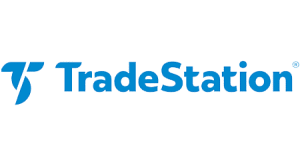
| PROS | CONS |
|---|---|
| Good charting and analysis tools | Steep learning curve to develop your own trading system |
| Ideal for active trading | Only available to US citizens |
| Wide range of educational resources |
Interactive Brokers
Interactive Brokers is well-suited to any experienced active trader, but beginners will find it hard to navigate the trading platform. They have efficient order execution, thanks to its IB SmartRouting technology.
Interactive Broker’s mobile app platform is well-supported across all devices. Beginners will find it difficult to use as it is aimed at more experienced traders. Read Full Review
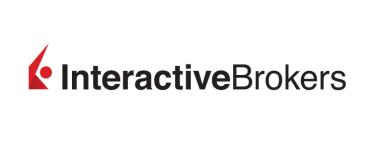
| PROS | CONS |
|---|---|
| Wide range of trading securities available | Not easy for beginners to navigate |
| Fast order execution | |
| Fractional shares | |
| Customizable alerts on the trading platform |
How Does The Stock Market Work
Companies issue stock to sell on a market. A stock market allows buyers and sellers to negotiate online stock prices. Investors then buy and sell these stocks among themselves.
The exchange keeps track of stock supply and demand. Share prices will change depending on the market demand.
What is an Online Broker?
An online broker buys and sells stocks and other securities on behalf of their clients. They handle transactions for both individual and institutional customers. They provide a range of different investment products and commission fees. Nowadays, many brokers offer zero-commission trading and a wide range of research tools for beginners.
How To Pick a Broker?
The key to successful investing is choosing a company that meets your investment goals and learning style.
Here are some of the most important aspects to consider before you make your decision.
Fees & Commissions
There are a range of different fees you should be aware of in advance. It's important to know what commission rates your broker charges per trade. Sometimes annual fees are better than per-transaction fees. This avoids unnecessary commissions.
Regulation
Regulated brokers will be registered with at least one financial regulating body in their country. The firms need to follow the rules set by these bodies.
Account Security
It’s important that you are aware of the privacy policies. Your brokerage should have security measures in place to protect your account. Because of growing cyber threats, most make your account security a priority. Features such as two-factor authentication should be a necessity.
Trading Tools and Research
User-friendly platform tools make successful trading a lot easier for beginners. They should offer access to a wide range of trade tools for you to make the most of every trade. If you're a beginner, you'll need advice on how to analyze data and diversify your portfolios.
Account Types and Minimums
Common account types are retirement accounts, margin accounts, and cash accounts. You should be aware of which accounts you can open. Different brokerages might have investment minimums for different types of accounts. Most ohave no minimum deposit requirements, while others require several thousand dollars.
Offering of Investments
There is a range of investment products out there for you to put your money into. Stocks, bonds, and options are the most common. You need to choose a brokerage that offers the investment products you're interested in.
You should have a strong selection of commission-free ETFs, mutual funds, and options.
Execution Speed
Your orders are sent to your broker to be executed. It's important to have efficient order execution, especially for active traders.
International Trading
If you plan to trade on foreign markets then it's important to have access to international trading. For investors living outside the US, you need a company that is regulated and offers services in your country.
Types Of Accounts
Retail vs Professional Accounts
Retail traders are individuals with no experience in day trading. They usually rely on knowledge picked up from educational resources on sites. Most retail traders use their own cash and generally trade stocks, options, or forex.
Professional trading accounts are only made available for traders with proven trading expertise. These accounts require a significant amount of available capital for investments.
Cash Trading Account
A cash trading account is for simply buying and selling securities using cash-on-hand. This doesn’t include borrowed capital or margin. Cash trading accounts are the default account options offered by online brokers. These accounts are simple to open and maintain.
Demo Trading Account
A demo account is funded with fake virtual money that allows a potential customer to experiment with a broker’s trading platform. This is also referred to as paper trading.
Paper trading is a great tool for beginners to test out an investment strategy before setting up a proper trading account with real money.
Managed Trading Accounts
A managed account is owned by a single investor, who is either an institutional investor or an individual investor. This account is managed by a professional money manager who is hired by the investor.
Cash Account Vs Margin Account
Margin trading is only for very experienced traders. Margin trading accounts are more complex to open and maintain compared to cash accounts.
This trading method involves trading assets using funds from a third party. This lets traders access larger sums of capital. Different brokerages charge various different margin rates on transactions.
Discount Brokerage vs. Full-Service Brokerage
A full-service brokerage offers you the full package. This includes investment planning, financial advice, and portfolio analysis. It comes at a steeper price but it’s worth it if you're new to investing.
Discount brokers only facilitate buy and sell orders through online platforms. While they offer lower commission rates, this doesn’t include any financial advising.
Trading vs. Investing (active traders vs investing for long term)
Active trading is trading that only lasts for seconds or minutes. This involves taking advantage of brief price fluctuations of an asset.
Long-term investing is a more passive strategy. It involves buying and holding assets for months or years.
Different brokers may offer incentives for different investment styles. You need to check that the commission rates match your trading style.
FAQ
How To Open A Brokerage Account?
1. Open an account
2.Once you have chosen a reliable broker,
follow their site instructions to set up an account. This usually
requires you to upload relevant documents and fill out a form.
3.
Make a deposit
4. Choose a payment method and fill in the form
for deposit funds. Check your account balance after you have made
the payment.
5. Start trading
6. Download the trading
platform, log in with your account details, and make your first buy
order.
Can I start trading with $100?
Most brokerages nowadays don't have a minimum deposit amount to open an account and make your first investment. Thanks to zero-fee brokers and fractional shares, it’s possible to start investing with only $100.
In order to properly get started though, you should aim to diversify your investment portfolio. This means buying a range of investment vehicles in different positions.
Can I make a living trading?
Trading is usually just a way for people to earn some extra income on the side. Only very experienced investors that devote a lot of time to managing their portfolios will generate enough profit to earn a living off trading.
Is Robinhood good for beginners?
With its free trades and no minimum account deposit, Robinhood is ideal for beginners in many ways. It has a trading platform that is easy to learn how to use. Beginners will have to find educational resources elsewhere though.